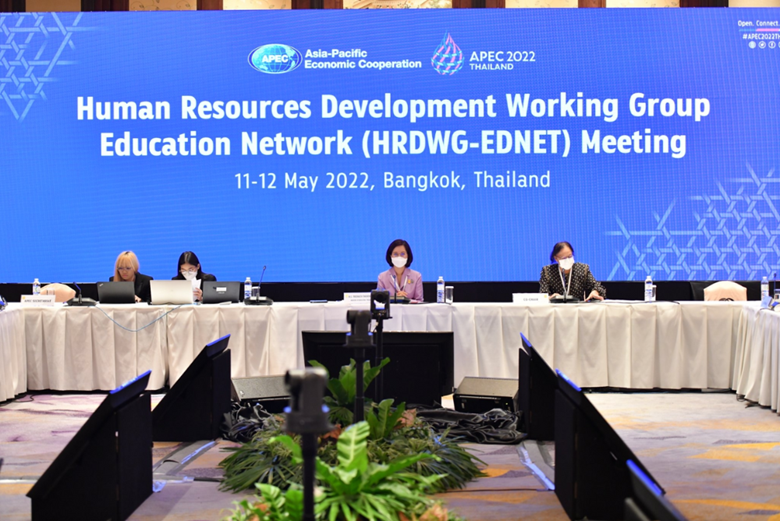Enhance Human Capital through Education and Cooperation: Minister

Education officials and experts from the 21 APEC member economies deliberated over the future of education as well as policy directions to enhance the quality of education for a sustainable economy, while making the best use of technology advancement and digitalization in education.
Thailand’s Minister of Education Treenuch Thienthong addressed delegates at the annual meeting of the Education Network (EDNET) associated with the APEC Human Resources Development Working Group, held virtually and in person on 11 and 12 May.
“We are aware that cultivating human capital through education is a critical component to ensure long-term economic growth,” Minister Treenuch said in her opening remarks. “Thailand is pleased to continue our cooperation with APEC member economies to ensure that learning never stops and no one is left behind.”
She reaffirmed Thailand’s commitment in working closely with economies to build a strong community that supports sustainable economic growth, social wellbeing and employability of all citizens in APEC economies.
According to Minister Treenuch, APEC provides member economies with an ideal platform of experience sharing to further promote quality education for all and strengthen education cooperation to achieve the theme of the education network meeting this year: “Quality Education for Sustainable Growth.”
Education ministers from nine APEC member economies (Brunei Darussalam; Chile; Indonesia; Malaysia; Mexico; New Zealand; the Philippines; Singapore; and Thailand) shared their vision through video remarks about how the region can rethink and reshape education by 2030.
Ministers shared how they addressed concerns and priorities of education development in their respective economies, as well as in the APEC region. This includes how digitalization and innovation are changing the education landscape, and how the role of teachers and school leaders are evolving with this development.
“The insights and perspectives of education ministers shed light on the future path of education development in each of their own economies and in the APEC region at large,” said Dr Wang Yan, the coordinator of the APEC Human Resources Development Working Group’s Education Network.
“People matter, and the way they acquire the ability to live better lives will have a huge impact on what we envision our future will be: inclusive, sustainable and resilient,” she added. “I believe that we can make a real difference if we pay more attention to education and push for progress in APEC.”
Officials also heard views from stakeholders, including chancellors, principals, and representatives from the technical and vocational education and training sector. They talked about lessons learned and best practices regarding student and provider mobility, the learning environment in a digital world, as well as solutions to bridging skills mismatches, taking into account the future of work.
“While the APEC region has recorded many achievements in the last three decades, the pandemic is exacerbating persistent challenges related to access to education, skills and the ability for us to develop our human resources for the future of work,” said Duriya Amatavivat, co-chair of the network. “Education is a crucial tool in confronting current and future human capital challenges by building a stronger, capable and more resilient generation.”
Delegates also heard views on the future of education and how regional cooperation can help reshape the education agenda from other international organizations such as the United Nations Educational, Scientific and Cultural Organization (UNESCO), the Southeast Asian Ministers of Education Organization, and the ASEAN Secretariat.
For further details and media inquiries, please contact:
[email protected]

